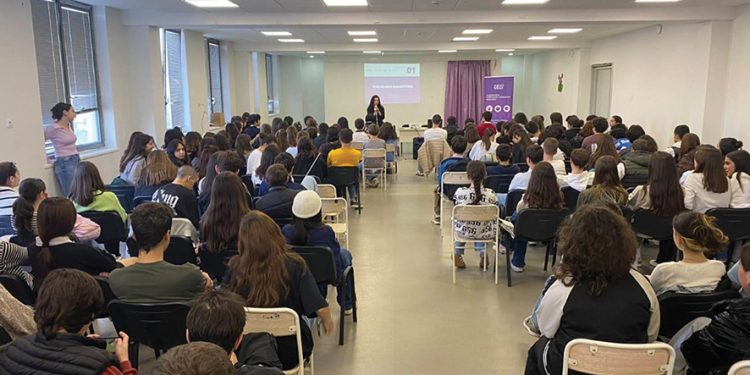Students across Georgia have been introduced to the foundations of finance and economics, with financial education sessions held by Project Harmony (PH) International Georgia’s USAID civics education program.
PH International is an organization based in post-USSR countries that partners with the United States to build communities through civic engagement, cross-cultural learning, and providing opportunities. Marina Ushveridze is the Chief of Party for the USAID civic education program that is implemented through PH International Georgia. The goal of the program is to raise the next generation to be civically active and responsible within their community, while promoting the use of technology in civic education.
The program also emphasizes connecting schools across the country with the private sector so they can receive better civic education. From October until December 2023, the USAID civic education program, in partnership with the Bank of Georgia (BOG) and the Georgian Economic Literacy Initiative (GELI) held financial education sessions at various schools. These occurred in all eleven regions of Georgia, reaching 153 schools and 2,275 students.
The initiative targeted students from grades seven to 12, and representatives from GELI led the sessions. Bakar Baratashvili, co-founder of GELI, said they used real-life examples so the students could better understand the concepts. He also stressed that they did not want the students to listen, rather, they encouraged everyone to participate.
The sessions were very interactive, with students wanting to both ask questions and answer them. This made Ushveridze feel good, she tells GEORGIA TODAY, because it shows they have a willingness to pay attention and consume as much as possible.
“Very often, the problem with young people is they spend more than they can earn,” Ushveridze notes. “So, financial education is very important at this age, so that kids start practicing smart spending in their everyday lives.”
Topics covered during the sessions varied and provided a foundation for learning about finance. How to invest, inflation, how to earn versus spend, how to choose a profession, how to budget and save money, buying houses, what kind of vacations to take, what is the role of the National Bank of Georgia, what is the role of the government in achieving financial stability – all of these were topics that were covered. Another major area was needs versus wishes, and how to differentiate between them while realizing the answer is not the same for everyone.
“The most important conclusion they made is that it depends on each individual,” Baratashvili tells us. “That’s what we need to learn to think about – is this really what I need or not? It depends on case to case.”
According to Baratashvili, students weren’t the only ones who were interested in the sessions, as their teachers were also actively involved when talking about monetary policy and hyperinflation during the 1990s. This was brought up to show the usage of coupons throughout the country during that time and to make a point that money can sometimes fail.
Each session had many participants, with the biggest holding roughly 200 students. The idea was for every school to bring a certain number of students; however, numerous students were interested, so more came than were anticipated. Baratashvili said having such a big turnout is great, although as each session was a maximum of one hour, there wasn’t enough time to answer everyone’s questions.
“We did it. We had 200 students in one room, and we still did it well, they still wanted to listen, and they were still happy to attend,” shared Baratashvili. “This means they really have an interest [in this topic].”
A big part of USAID’s civic education program and GELI is to connect schools with the private sector across the country. Both organizations agree that financial learning is crucial for becoming a successful and good citizen, especially when it comes to managing and being aware of one’s budget. Baratashvili explains that a big reason the private sector is needed is for the funding of these projects, and he said that the Bank of Georgia’s support made it possible for them to hold the financial sessions.
Head of the Corporate Social Responsibility Team at BOG, Ana Lomtadze, said they align with PH International’s wanting to increase the private sector’s involvement with financial literacy among Georgian schools. She wrote in an email that they believe BOG, along with other businesses, has a responsibility to contribute to this area. In addition to being a part of the financial sessions, the bank has also worked with PH International and their Financial Literacy Olympiad initiative and has partnered with the National Bank of Georgia on other programs.
BOG has also created something in hopes of further helping school children develop in this area.
“We’ve developed a dedicated financial app, sCool App, the first banking app for school students, specifically designed to engage young minds and promote financial literacy from a formative age,” wrote Lomtadze. “The continued development and expansion of the sCool App, both internally and through partnerships, exemplifies our dedication to amplifying our efforts in this crucial space.”
GELI was created because Baratashvili and his co-founder saw a gap in financial literacy throughout Georgian schools. The organization works with the Economics Fundamental Initiative (EFI) to provide financial literacy through a simple, easily readable book called ‘Common Sense Economics,’ which was translated into Georgian and is free on the GELI website. In addition to this, the organization has assisted in teaching at schools, conducting teacher training in finance, piloting economic and finance classes, and participating in the Economics Olympiad.
Their main mission is to educate teachers about the basics of finance and economics, so schools can incorporate it into their curriculum and teach students. GELI believes that this subject can go hand in hand with civic education courses that are mandatory for Georgian school children.
Currently, Ushveridze said there is no talk about the financial literacy sessions reoccurring; however, if they were to happen again, there would be communication with the same partners. The sessions were free to attend and took place directly after the school day, making it accessible for students to attend. Ushveridze saw these sessions as a useful reward for students.
“Young people are dreamers, and they should be. This is indeed exciting, but it’s also very nice to see how they start planning specific steps to make their dreams come true,” she notes. “What are the steps to getting closer to the fulfillment of their dreams? Thinking realistically and taking action is important. I think somehow this project, with really short sessions, left them with knowledge lets them be more realistic about their future plans and dreams.”
By Shelbi R. Ankiewicz














